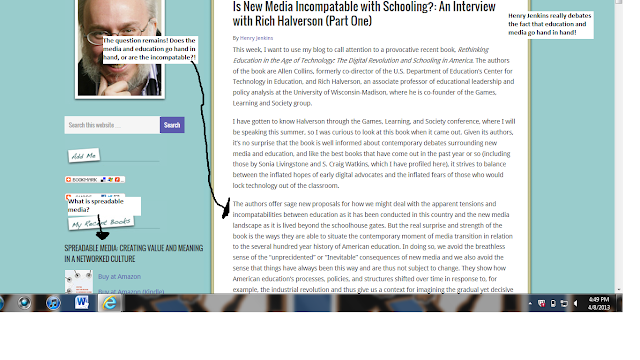
Henry Jenkins is a very interesting man, and this is a very interesting article! Henry Jenkins talks directly about the question that has been burning in my mind. I know the picture is super small so
here is the link to the article. Jenkins talks about what our class has been discussing, peer-based learning. In the article Jenkins quotes a quote from his father saying, "never let schooling get in the way of your education." It took me almost 5 minutes to understand what this quote was truly saying. Jenkins pushes the idea that schooling and education are becoming more and more intertwined. Jenkins idea of schooling is the formal way of learning. Sitting in a classroom, reading from a textbook, listening to a teacher, the usual. However, his idea of education is gaining knowledge, whether that be from Facebook, a new Beyonce song, the morning news, or even the text you got from your friend with the directions to a party, it is all learning! I can easily side with Jenkins because I to agree that knowledge doesn't always come from a teacher. We focus so much in class about connected learning, and peer based learning but I don't think we ever take our thoughts serious! BUT WE SHOULD! Jenkins backs up everything we say! Are learning should not all come from teachers or the formal way! Honestly, this article backs up what we've been asking all semester; what are other ways of learning? Connected learning! I think it is really interesting that this conversation is happening elsewhere, not just in our English class.

I believe that a lot of younger people have the same point of view on this subject. However, adults on the other hand feel as if you can't learn from a movie or Twitter! This is really important to me and should be important to other students because I believe we can build from here. Just knowing that other people feel like we can learn from the media is means to start a rally! We could rally for Twitter/Facebook textbooks for classes. Or a curriculm focused around texting, and how to get better WPMs! This add fuel to the fire or to the conversation that media is directly connected to learning. This just shows the positive way in which it is connected. But is there a negative way?! Stay tuned......



